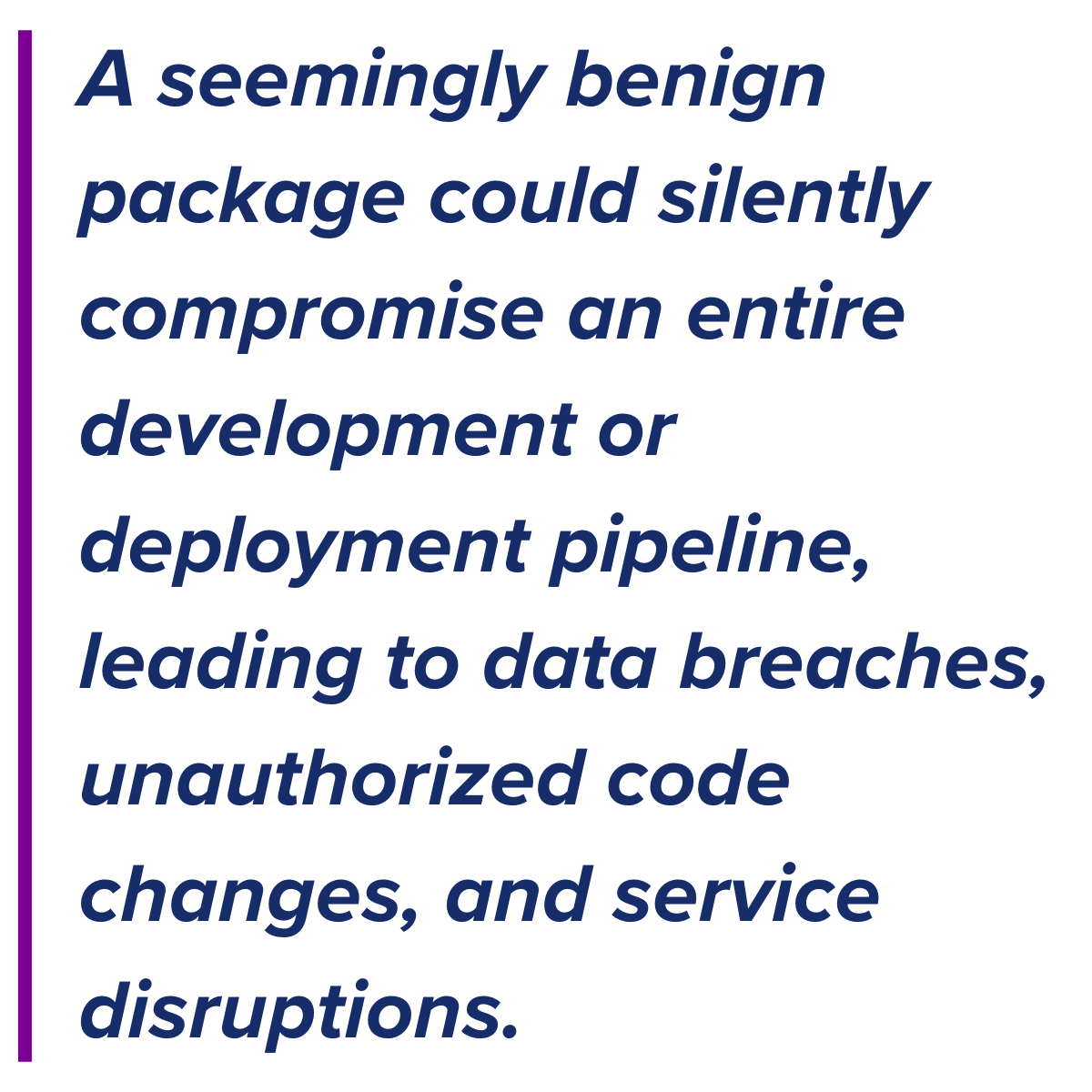Blog and News
Fortifying Federal Applications: What the Shai-Hulud Worm Taught Us About Software Security
In September 2025, the software world saw one of the most severe JavaScript supply chain attacks to date. More than 500 Node Package Manager (NPM) packages were infected by a self-replicating worm known as Shai-Hulud, spreading through open-source libraries and quietly stealing GitHub tokens, cloud credentials, and API keys.
Bixal activated a three-phase incident response across our internal systems and client environments, auditing repositories, isolating vulnerable components, and securing development pipelines for our federal partners.
Our Proactive Defense Strategy Against the Shai-Hulud Worm: A Three-Pronged Approach
Our software engineering team quickly mobilized to defend against the Shai-Hulud threat, developing and executing a comprehensive response plan focused on containment, detection, and long-term prevention.
1. Containment: Stopping the Spread
![]()
The immediate priority was to isolate and neutralize the threat. This involved:
- Removing compromised packages: Identifying and eliminating any potentially infected node_modules folders and clearing associated caches across all development environments.
- Disabling dangerous scripts: Temporarily preventing lifecycle scripts from running during package installations to cut off the worm’s propagation method.
- Revoking leaked credentials: Auditing and revoking any potentially compromised NPM or GitHub tokens to prevent further unauthorized access.
2. Detection and Verification: Finding and Confirming
![]()
Following containment, a thorough audit was crucial:
- Dependency audits: Scanning all project repositories for known malicious dependencies using tools like Dependabot and Snyk.
- Continuous Integration/Continuous Delivery (CI/CD) inspection: Meticulously examining GitHub/workflows configurations for any suspicious modifications, new workflows, or changes in repository visibility that might indicate a compromise.
- Build integrity checks: Verifying the integrity of critical packages after reinstallation to ensure there is no lingering malicious code.
3. Hardening and Prevention: Building for the Future
![]()
Beyond immediate remediation, our long-term strategy focuses on implementing robust practices to prevent similar attacks:
- Enforcing exact versions: Pinning exact versions of dependencies ensures that only verified versions are used, preventing malicious updates from sneaking in.
- Continuous monitoring: Implementing systems to alert unusual workflow creation, token usage anomalies, or changes in repository visibility.
- Developer education: Training our teams on secure NPM usage guidelines and integrating these best practices into our standard operating procedures.
This proactive stance is a testament to our dedication to maintaining the highest security standards for our government partners.
Closing the Attack Vector: A Technical Deep Dive into Prevention
The core of the Shai-Hulud Worm attack vector lies in the default behavior of Node.js package installations; specifically, the automatic execution of lifecycle scripts.
How the Shai-Hulud Worm operated:
- Exploiting installation: During a routine package installation, the malicious code would execute silently.
- Credential theft: The worm could then steal sensitive environment secrets, like GitHub tokens, which grant access to code repositories.
- Lateral spread: With stolen credentials, the attacker could modify CI/CD pipelines, inject backdoors, and even spread to other repositories, potentially compromising internal systems or client applications.

This creates a high-risk scenario: a seemingly benign package could silently compromise an entire development or deployment pipeline, leading to data breaches, unauthorized code changes, and service disruptions.
Today, our approach to preventing attacks focuses on disabling these scripts by default, allowing them only for explicitly trusted packages.
Here's a simplified look at how we enforce this:
- Disabling lifecycle scripts: We can globally or project-specifically configure NPM to ignore these scripts during installation using settings like ignore-scripts=true. This effectively blocks unknown code execution.
- Whitelisting trusted packages with allow-scripts: For legitimate packages that do require lifecycle scripts (e.g., for compilation), we use a utility like @lavamoat/allow-scripts. This plugin acts as a gatekeeper, permitting scripts only for packages explicitly declared in a project's configuration.
This approach transforms the default “allow all” into a “deny all, permit by exception” model, significantly shrinking the attack surface.
A Secure Foundation for Federal Initiatives
![]() The Shai-Hulud Worm serves as a stark reminder that even seemingly small vulnerabilities in the software supply chain can have far-reaching consequences. For government agencies managing sensitive data and critical services, robust security protocols are non-negotiable.
The Shai-Hulud Worm serves as a stark reminder that even seemingly small vulnerabilities in the software supply chain can have far-reaching consequences. For government agencies managing sensitive data and critical services, robust security protocols are non-negotiable.
At Bixal, our expertise in navigating complex security challenges and implementing proactive defense strategies ensures the web applications we deliver are not only functional but also resilient against evolving threats.
By embracing best practices like strict dependency management, continuous monitoring, and developer education, we provide our federal partners with the confidence that their digital infrastructure is built on a foundation of uncompromised security.
Ready to Strengthen Your Software Supply Chain?
Contact us today using the form below to get started.